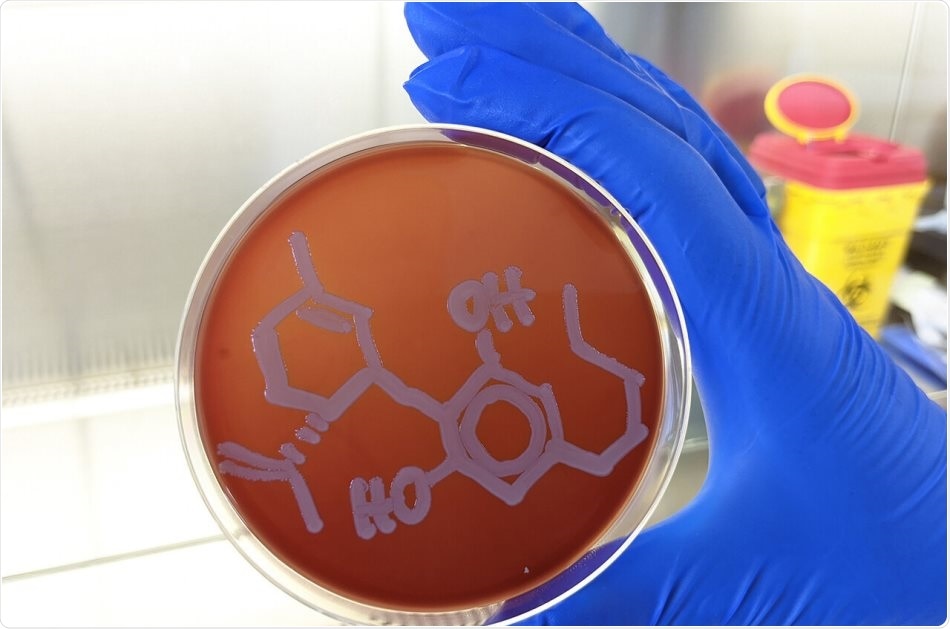For the first time, synthetic cannabidiol, commonly called CBD, has been demonstrated to destroy the bacteria that cause meningitis, gonorrhea, and Legionnaires’ disease.

Bacteria growing in the shape of the synthetic cannabidiol molecule. Image Credit: Institute for Molecular Bioscience, University of Queensland.
The study, which is a joint effort between The University of Queensland (UQ) and Botanix Pharmaceuticals Limited, may lead to the development of the first new range of antibiotics for resistant bacteria in six decades.
According to Mark Blaskovich, an Associate Professor from the Institute for Molecular Bioscience at UQ, CBD—the primary nonpsychoactive component of cannabis—can invade and destroy a wide variety of bacteria, such as Neisseria gonorrhoeae, which is responsible for causing gonorrhea.
This is the first time CBD has been shown to kill some types of Gram-negative bacteria. These bacteria have an extra outer membrane, an additional line of defence that makes it harder for antibiotics to penetrate.”
Dr Mark Blaskovich, Associate Professor, Institute for Molecular Bioscience, University of Queensland
Gonorrhea is known to be the second most common sexually-transmitted infection in Australia, and since the bacteria are specifically good at developing resistance, a single reliable antibiotic is no longer available to treat this infection.
The new study also demonstrated that CBD was considerably effective against a relatively greater number of Gram-positive bacteria than previously believed, including antibiotic-resistant pathogens like methicillin-resistant Staphylococcus aureus (MRSA) or “golden staph.”
Cannabidiol was specifically effective at breaking down biofilms—that is, the slimy build-up of bacteria, like dental plaque found on the teeth surface—that help microorganisms, like MRSA, survive antibiotic treatments, added Dr. Blaskovich.
Dr. Blaskovich’s group from the Centre for Superbug Solutions imitated a two-week patient therapy in laboratory models to observe how quickly the bacteria mutated to try to trick the killing power of the CBD.
Cannabidiol showed a low tendency to cause resistance in bacteria even when we sped up potential development by increasing concentrations of the antibiotic during ‘treatment’. We think that cannabidiol kills bacteria by bursting their outer cell membranes, but we don’t know yet exactly how it does that, and need to do further research.”
Dr Mark Blaskovich, Associate Professor, Institute for Molecular Bioscience, University of Queensland
The team also found that chemical analogs—produced by slightly altering the molecular structure of the CBD—were also active against the microorganisms.
Dr. Blaskovich added, “This is particularly exciting because there have been no new molecular classes of antibiotics for Gram-negative infections discovered and approved since the 1960s, and we can now consider designing new analogs of CBD within improved properties.”
According to Vince Ippolito, the President and Executive Chairman of Botanix, the study demonstrated a huge potential for developing effective treatments to combat the rising global threat of antibiotic resistance.
Congratulations to Dr Blaskovich and his team for producing this significant body of research—the published data clearly establishes the potential of synthetic cannabinoids as antimicrobials. Our Company is now primed to commercialize viable antimicrobial treatments which we hope will reach more patients in the near future. This is a major breakthrough that the world needs now.”
Vince Ippolito, President and Executive Chairman, Botanix
Dr. Blaskovich added that working with Botanix has expedited the study, with the latter providing formulation know-how that has resulted in identifying that the way cannabidiol is administered makes a significant difference in its effectiveness at destroying bacteria.
The association has allowed Botanix to advance a topical CBD formulation into clinical trials for the decolonization of MRSA prior to surgery.
“Those Phase 2a clinical results are expected early this year and we hope that this will pave the way forward for treatments for gonorrhea, meningitis, and legionnaires disease. Now we have established that cannabidiol is effective against these Gram-negative bacteria, we are looking at its mode of action, improving its activity and finding other similar molecules to open up the way for a new class of antibiotics,” Dr. Blaskovich concluded.
Establishing the antibiotic potential for cannabis
Video Credit: University of Queensland.
Source:
Journal reference:
Blaskovich, M. A. T., et al. (2021) The antimicrobial potential of cannabidiol. Communications Biology. doi.org/10.1038/s42003-020-01530-y.